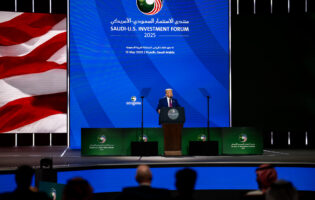G20 – Global Trade Governance in Uncertain Times

Stormy-Annika Mildner
Executive Director, The Aspen Institute Germany
Stormy-Annika Mildner is the executive director at the Aspen Institute Germany and a Geoeconomics Non-Resident Senior Fellow at AICGS. She was Sherpa of the Business 20 (B20), the official Engagement Partner of the German G20 Presidency and Head of the External Economic Policy Department at the Federation of German Industries (BDI).
The G20 is facing its second big litmus test. Almost ten years ago, only decisive action by the G20 prevented the global economy from spiraling into a deep depression. Not only did the G20 coordinate macroeconomic policies; the leaders also committed to a standstill and rollback on protectionism and thus preempted beggar-thy-neighbor policies. The G20 played a vital role in preventing a repetition of the Great Depression of the 1930s.
Ample Challenges
Today the G20 faces several challenges. While stability and resilience of financial markets have greatly improved, global economic growth remains subdued. Many countries are still struggling with high unemployment rates and socioeconomic inequalities. There has been a worrisome increase in protectionist measures worldwide, dampening growth. In addition, geopolitical conflicts, climate change, terrorism, and mounting questioning of the international order make 2016/2017 one of the most uncertain periods in decades. Recent elections and referenda in both emerging and developed countries have shown that many are discontent with the political establishment.
Finding compromises has become more difficult in the G20. This year’s G20 cycle is very short. Instead of September (G20 China) or November (G20 Turkey, G20 Australia), the German G20 summit is scheduled for early July due to the upcoming general elections in Germany. This gives the G20 little more than seven months to find compromises on a wider range of often controversial issues. This is even more challenging given the fact that several governments—the United States, the UK, and Italy—are new to the game; for the United States, some of the key negotiators are still not determined, no less the precise position on many topics. Upcoming elections in G20 countries, such as in France and the UK, also slow down decision-making.
Trade as a Litmus Test
At their meeting on March 17/18, in Baden-Baden, the G20 Finance Ministers and Governors of Central Banks acknowledged that trade is central to economic development. However, the G20 failed to make a clear statement against protectionism. A strong commitment to trade as an engine for growth, prosperity, and innovation as well as against protectionism is very much needed—even more so in the current context of increasing geopolitical uncertainty and anti-globalization sentiment. The World Trade Organization (WTO) has highlighted over 1,600 new trade restrictions introduced by G20 members since 2008, of which more than 1,200 are currently in force.
Many conflicting topics appear to be bogging down the trade negotiations. G20 members find it hard to agree on what exactly constitutes a protectionist barrier. Antidumping (AD) measures are a case in point. AD measures are allowed under the rules of the WTO to counter unfair trade when products are dumped on the home market from abroad. While some view AD measures as legitimate trade instruments, others argue that they are a hidden form of protectionism. Another hot topic on the trade agenda are overcapacities (in particular for steel). The G20 had already discussed this issue under the Chinese G20 presidency, agreeing to create a Global Forum on Steel Excess Capacity. Mandated to report annually to the G20, it comprises the G20 economies, as well as other members of the Organization for Economic Cooperation and Development (OECD). But little has come out of this forum so far, so that G20 members, including the United States, are calling for more action.
Not less conflictual is the issue of trade balances. How to handle macroeconomic imbalances—which were viewed as one of the causes of the recent financial and economic crisis—proved a difficult agenda point for the G20, with deficit countries such as the United States on one side and surplus countries such as China on the other. In 2011, under the French presidency, the G20 finance ministers, however, agreed on five “indicative guidelines” under the MAP according to which the individual countries’ policies would be evaluated. The criteria included: public debt and fiscal deficits; private savings rate and private debt; and the external imbalance composed of the trade balance and net investment income flows and transfers. However, the process under the IMF does not seem sufficient for the Trump administration, which seems to view trade surpluses as a sign of unfair trade rather than caused by structural factors. By executive order, Trump just recently called on the Department of Commerce and the USTR to conduct a country-by-country, product-by-product review of the causes of U.S. trade deficits, targeting major trading partners such as China, Japan, and Germany.
Last but not least, G20 countries differ on the future trade agenda. While some, such as India, point at the unfinished business of the Doha Round of the WTO, others, including Germany, would like to place new issues on the agenda, reflecting the changing nature of trade. One of these issues is digital trade. At the meeting of Digital Ministers early April, G20 members acknowledged the importance of digital trade to boost inclusive growth and jobs. They also agreed on the importance to map and measure digital trade and mentioned the upcoming WTO Ministerial Conference (MC11) in the framework of further WTO discussions on e-commerce. While this should already be viewed as success given the current climate, commitments remained rather vague in the end.
Trade promotes global prosperity. Between 1990 and 2014, world trade increased about fivefold, with global per capita income growing by a factor of 2.5. This had a very real and positive effect on people’s lives: hundreds of millions of people have been moved out of poverty, with increasing incomes, welfare, and living standards. At the same time, an increasing number of communities feel they are on the losing end of greater competition as well as shifting production and demand patterns. More and more people find it hard to adapt to a rapidly changing world. The G20 should thus reaffirm its strong commitment to open and inclusive markets as well as to the standstill and rollback agreement on protectionism.
Governments also need to ensure that trade and investment are not merely free but also enable people to seize opportunities in a changing world, by ensuring social safety nets and strengthening efforts to improve education and lifelong learning. The G20 should reiterate its support for the WTO and its multilateral, rules-based trading system, including its dispute settlement mechanism. Given the changing nature of global trade, global rules should be modernized, paying greater attention to digital trade as well as investment facilitation. Only a modern, rules-based, global trade system will ensure that trade benefits all.
The Way Forward
The agenda of the German G20 Presidency is ambitious. It remains to be seen if the G20 will weather the storm and will prove a successful forum for global governance in challenging times. What remains clear is that this is not the time for national solo-runs. This is a time for international cooperation and for a strong G20.









